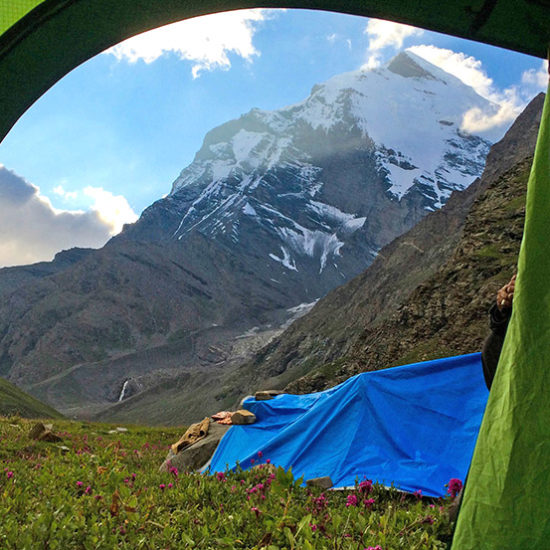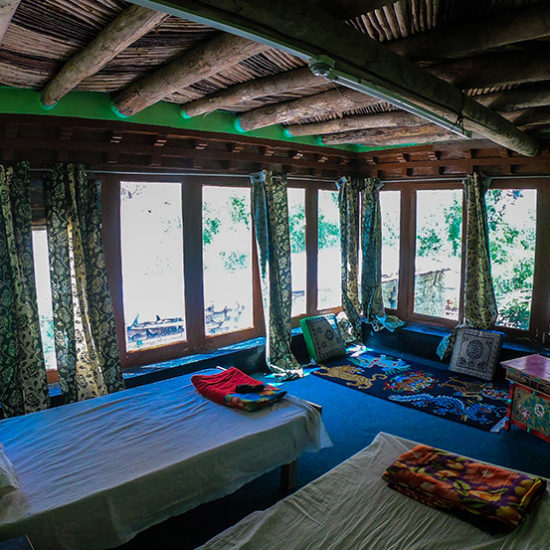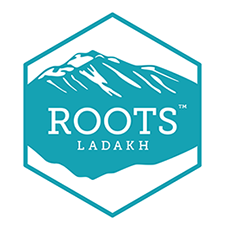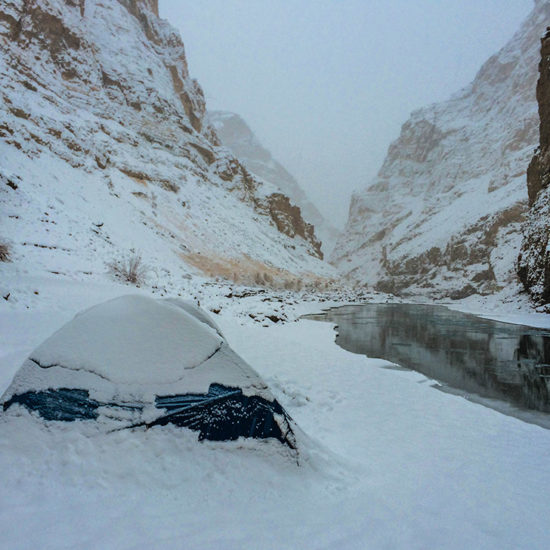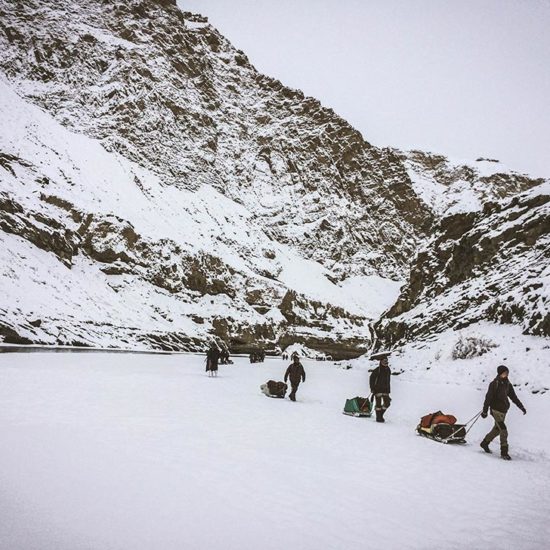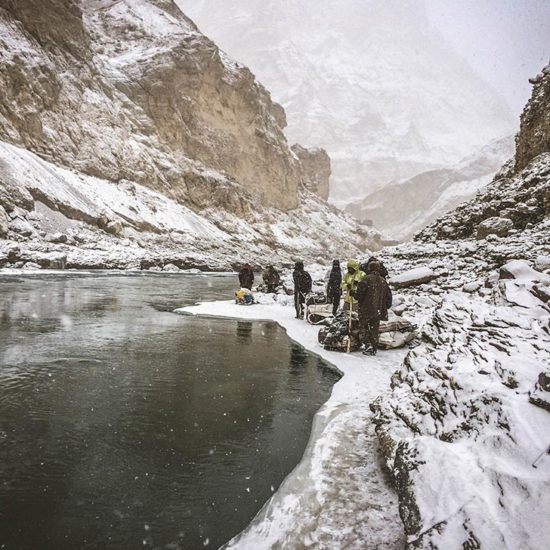Chadar Trek
The term “chadar” meaning “blanket” is representative of the ice cover that forms over the river in the dead of winter. You will realize, on the trek, that it cannot be better described.
The Chadar Trek is a route connecting villages along the frozen Zanskar River during the winter. The route has been used for centuries for trade and transportation, and is the most reliable in February when the ice is most stable.
The Zanskar river is big and fast flowing. It is confined between a steep canyon, for the most part, between chilling and the Zanskar valley. The experience will definitely challenge one’s threshold of fear. The trek from Chilling to Zanskar valley takes more than a week. This trek is considered to be one of the most unique and exciting treks.
The Chadar trek is an endangered activity and it will cease to exist within the next 5 years. A road is being built by blasting out the rock face over the river. Once this project is completed, life of the Zanskaris will be much simplified during the winters and the Chadar trek will turn into an ancient local practice.
Join us on this dream journey, which is a time capsule of sorts, that will take you back to simpler times.
-
Tour StartsLeh
-
Tour EndsLeh
-
Style of TourTrekking (6 days)
-
Max Altitude3390m
-
Approx Trekking60 to 65kms
-
Trek DifficultyModerate to Hard
-
No of PassesNone
-
Best SeasonJanuary to Mid February
-
StaysHotel in Leh, Camps during the trek
-
MealsMAP basis in Hotels (Breakfast and Dinner)
Day 1: Arrive Leh (3500m)
- Arrival at Leh.
- Meet us at Leh and check in to the hotel. The first day is kept for relaxation and recuperation.
- The night will be spent at the hotel.
Day 2: Acclimatization Day
- Early morning briefing session, equipment check
- Spend this day acclimatizing to the high altitude of Leh
- Spend your time at leisure exploring Leh market, Leh palace and Central Asian Museum
- Overnight at hotel<
Day 3: Medical Fitness Check up + Last minute shopping
- After breakfast, we will go to the local SNM hospital for a medical fitness check up. (It has been made mandatory by the local administration for every trekker going on Chadar trek without which one will not be allowed to join the trek)
- You will be dropped back to the hotel or the market post getting the medical certificate.
- Second half of the day can be spent doing some last minute shopping/exploring Leh town or resting.
- Overnight at the hotel
Day 4: Drive from Leh to Shingra Yokma followed by trek from Shingra Yokma (3140m) to Gyalpo (3200m)
- Early morning we will drive to Shingra Yokma via chilling.
- It is a 65 km long drive. (2 to 3 hours)
- Gyalpo is a 10 kilometer trek away from Tilad Do along the Zanskar River.
- Spend the night in tents
Day 5:Trek from Gyalpo to Dibb Cave (3300m)
- After an early breakfast, gear up for a long day.
- The trek to Tibb Cave is 15 km long.
- You will see many frozen waterfalls, one higher than the other.
- Spend the night in tents at Tibb.
Day 6: Trek from Dibb Cave to Nyerak (3390m)
- Gear up for a 12 and half kilometer trek to Nyerak Village.
- The long march along the river is as hard as it is fulfilling.
- Tents will be set up by the river for the night.
Day 7: Trek from Nyerak to Dibb Cave
- Get up early and enjoy the view as breakfast is prepared.
- We will trek back to Tibb Cave (12 km)
- Get there by early evening to set up camp.
- Spend the night in tents by the river.
Day 8: Trek from Dibb Cave to Shingra Kongma
- Post breakfast, we’ll continue trekking back from the same route that we came from.
- You would be a bit low on energy after trekking for 5 days so we will take it easy.
- Once we reach Gyalpo, we’ll set up camp by a warm fire and get warm.
- Spend the night in tents by the river.
Day 9: Trek from Shingra Kongma to Tilad Do and drive to Leh
- This will be the final day of the magical Chadar Trek.
- We will trek back to the starting point, Tilad Do via Shingra Koma.
- We will reach there, early in the evening if all goes as planned.
- A jeep will take us back to Leh, where you can sleep like a baby after this long, long journey.
- Spend the night at a hotel in Leh.
Day 10: Departure From Leh
- Departure from Leh.
- You can celebrate the completion of the Chadar Trek. You can also rest assured that you will never forget the things you would have seen and learnt along the beautifully gritty journey.
- INCLUSIONS
- EXCLUSIONS
- ADDITIONAL INFO
- Airport transfers
- Trek point transfers
- Breakfast and dinner at hotel in Leh
- All meals on the trek (Freshly prepared vegetarian food)
- Twin sharing rooms at premium hotel in Leh
- Dome tents on trek
- Camping gear (dome tents, dining tent, toilet tent, mattress, sleeping bags, hot water bottle etc)
- Safety gear
- Rubber gum boots
- Micro spikes
- Onsite first aid
- Oxygen cylinder
- Trained and experienced guide/trek leader
- Kitchen and support staff
- Porters/Mules
- Trekking permits
- Camping charges
- Single room accommodation
- Lunch during stay in Leh
- Transport for local sightseeing on day 1, 2 and 3
- Personal porter
- Medical check up fee
- Personal equipment such as walking sticks, rain coats, gloves etc
- International & Domestic flight fares, visa charges
- Monument/monastery and Museum visit fees.
- Any expenses of personal nature such as mineral water, laundry.
- Any kind of insurance, such as accident, theft, medical, evacuation etc.
- Cost incurred incase of evacuation or any emergency
- Tips to porters, camping team, driver, guide, etc.
- Cost incurred due to change / extension in the itinerary due to roadblocks, bad weather condition, flight delays, vehicle breakdowns, etc
- We have a zero trash tolerance policy. We always clean up after ourselves on all hikes and trips
- We use portable T3 tents and portable toilets and wash basins at our campsite which are cleared and wrapped up at the end of each journey.
- Our camp locations are temporary and we don’t keep any permanent fixtures at the location. We say no to plastics
- Be Local – there is no harm learning at few local words while you are there. It always helps in building a rapport with the locals and blend in. Try to eat and buy locally. Carry your own water bottles.
- We use comfortable mattresses with -10degree sleeping bags
- There is no electricity at most of our campsites as they are at remote locations. We use solar powered tent lamps.
- Our trips require a moderate level of fitness.
- The maximum altitude for treks can go upto 6100m
- Drink lot of water to stay hydrated and to avoid mountain sickness
- We always carry a first aid kid and a portable oxygen canisters for emergencies
- Average of two guides are provided for a group of 10 people
- We respect the local traditions and customs. We will always brief you regarding these each time you travel to a different location. We encourage you to be open and free while travelling to these locations and invite you to explore the region in its true sense.
- We focus on engaging local communities in our work to create livelihoods locally. Most of our camps/homestays are managed by the local villagers and local youth is engaged as guides/hosts
- We organize workshops to train local communities and youth for technical training in mountain guiding, hospitality and responsible tourism. If you are interested in contributing, do let us know.
- Valid ID proof (Passport/Voter ID/Drivers Licence)
- 70 to 90 litre backpacks
- Water-proof trekking shoes
- Down feather jacket (a must)
- Rain poncho or jacket/windcheater (a must!)
- Thermal inner (both upper and lower) with one spare
- Woollen or fleece sweater/jacket
- Full sleeve t shirt (one spare)
- Trekking pants preferably water proof (one spare)
- Woollen cap
- Thick buff/balaclava or muffler to cover your mouth and nose
- Thick gloves with inner
- Woollen socks (3 pairs)
- Cotten socks (4 pairs)
- Spare under garments(three pairs)
- Sun goggles
- Sun block
- Trekking pole
- Wearable Flashlight with extra batteries
- Water bottle, preferably wide mouthed, with at least one litre capacity
- Warmee
- Personal toiletries and first aid kit
- Power bank
- Delays are expected on account of roadblock & weather conditions. Our effort will be to continue with the trip as per the schedule & make you as comfortable as possible. But in such situations we may have to compromise on the campsite & adjust to these situations then & there. The final call will be taken by our Lead Guide on location.
- The itinerary should be viewed as ideal & we may have to make some spot changes due various unavoidable reasons.
- The distances & altitude mentioned in the above itinerary are to the best of our knowledge & information; marginal variance in the actual distances & altitudes is possible.
- You are expected to be in reasonable shape and fitness, being able to walk for several hours at a normal pace as well as to take care of your own equipment.
- The local administration has made it compulsory for every trekker to get a Medical Fitness certificate from the local SNM hospital in Leh on the 3rd day of your arrival in Leh. You will not be allowed to perform the trek without clearance from the hospital.
- The minimum age restriction for this trip is 18
- All outdoor related activities involve a certain level of risk. You are expected to sign an Indemnity Form in agreement to the risks involved through part taking in such outdoor activities.
- Roots Ladakh reserves the right and permission to use photographs of individuals and photographs submitted by them on tour for use in promotional and publicity purposes

